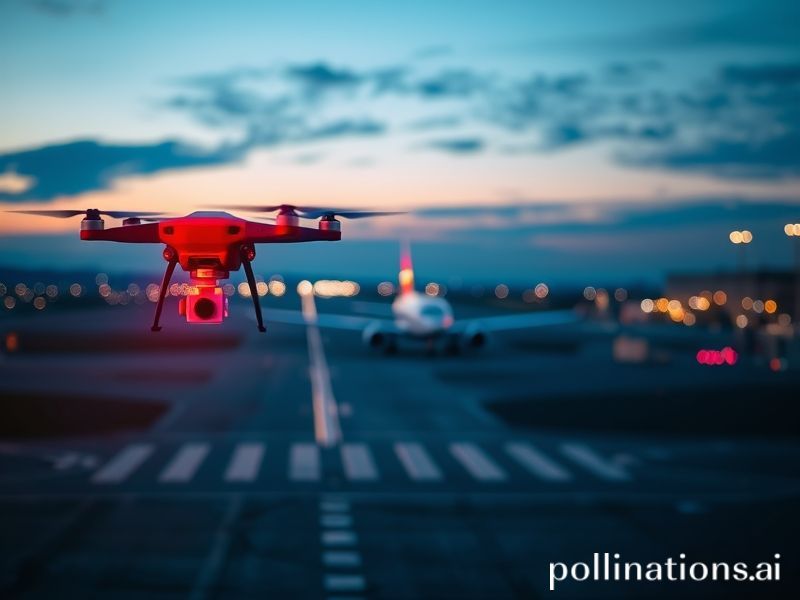Copenhagen Airport Drone Chaos: How a €400 Toy Grounded Scandinavia and Reminded the World That Airspace Is Overrated
Copenhagen Airport Drones: When the Vikings’ Descendants Discover That Airspace Is Just Another Playground
By the time Danish police finally admitted the obvious—“Yes, those blinking dots over Runway 22R are not extraterrestrials but consumer-grade quadcopters”—the world had already moved on to the next outrage. Still, the 54-hour closure of Scandinavia’s busiest hub felt like a morality play staged for a planet that can’t decide whether it’s terrified of drones or simply bored by them. After all, Gatwick did this schtick in 2018, Dubai reprised it in 2022, and somewhere a Shenzhen factory is already printing the sequel.
The official narrative is comfortingly Danish: a few “mischief-makers,” perhaps fresh from a hygge-infused Netflix binge, decided that disrupting 109,000 passengers was a reasonable Tuesday activity. Copenhagen Police dutifully deployed helicopters, infrared scopes, and that uniquely Scandinavian weapon—open dialogue—while SAS and Norwegian Air collectively hemorrhaged €10 million and at least three corporate reputations. Minister of Transport Thomas Danielsen called it “unacceptable,” which, in Danish political language, ranks just below “slightly disappointing cinnamon pastry.”
But zoom out and the scene is less Hans Christian Andersen, more global tragicomedy. Every major airport from LAX to Changi now owns a cupboard full of anti-drone rifles, signal jammers, and eagle trainers (yes, literal eagles). None of them work reliably, a fact quietly celebrated in the boardrooms of defense contractors who charge per failed test. The Copenhagen incident merely reminded investors that perpetual low-grade chaos is bullish for “drone mitigation solutions,” a phrase that sounds like therapy for depressed quadcopters but translates to a €4 billion market by 2027.
Meanwhile, the International Civil Aviation Organization convened an “extraordinary session” in Montreal—extraordinary being ICAO-speak for “we’ll issue a strongly worded press release and schedule lunch.” Their takeaway: national regulators should “harmonize” drone laws, which is diplomat-speak for “good luck teaching 195 countries to agree on anything, let alone a 900-gram piece of plastic with a camera.” The United States promptly proposed mandatory remote ID; the EU countered with geofencing; China offered to sell everyone the problem and the solution in one convenient bundle.
Back in Kastrup, conspiracy theories bloomed faster than tulips in April. Russian sabotage? Climate activists auditioning for a darker sequel to “How to Blow Up a Pipeline”? A disgruntled frequent flyer upset about last week’s lost herring sandwich? The truth, when it eventually crawled out from under a pile of discarded boarding passes, was depressingly pedestrian: a 40-year-old hobbyist and his teenage sidekick wanted cool night shots for TikTok. Their footage now sits in an evidence locker, racking up zero likes, which in 2024 may be the harshest punishment society can inflict.
The broader significance? Air travel, once the crown jewel of modernity, has become a hostage to any idiot with €400 and a YouTube tutorial. The same democratization of technology that lets rural Kenyan farmers map drought with drones also allows suburban teenagers to shut down half of Europe. It’s the democratization of chaos, and like most democratic exercises lately, it ends in recrimination, security theater, and a fresh line item on your ticket labeled “aviation resilience surcharge.”
Copenhagen will tighten local laws, airlines will buy newer, shinier counter-drone gadgets, and passengers will obediently arrive three hours early to watch security staff wave vaguely scientific boxes at the sky. Somewhere, a bored teenager is already shopping for a drone that flies higher, quieter, and just out of reach of the next great Nordic solution.
In the end, the Vikings’ descendants learned what the rest of us already knew: the sky is no longer the limit; it’s merely the latest frontier of human pettiness. And the gods, if they’re watching from Valhalla, are probably updating their frequent-flyer apps and muttering, “Well, at least it’s not longships this time.”







